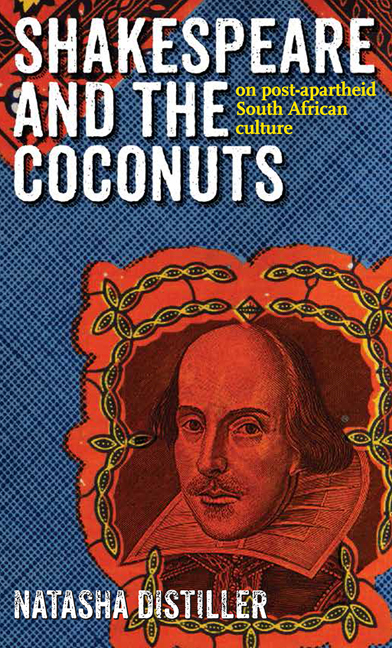Book contents
- Frontmatter
- Contents
- Acknowledgements
- Introduction
- Chapter 1 Shakespeare in English, English in South Africa
- Chapter 2 ‘Through Shakespeare's Africa’: ‘Terror and murder’?
- Chapter 3 Tony's Will: Titus Andronicus in South Africa, 1995
- Chapter 4 Begging the questions: Producing Shakespeare for post-apartheid South African schools
- Chapter 5 English and the African Renaissance
- Chapter 6 Shakespeare and the coconuts
- Endnotes
- Bibliography
- Index
Chapter 2 - ‘Through Shakespeare's Africa’: ‘Terror and murder’?
Published online by Cambridge University Press: 21 April 2018
- Frontmatter
- Contents
- Acknowledgements
- Introduction
- Chapter 1 Shakespeare in English, English in South Africa
- Chapter 2 ‘Through Shakespeare's Africa’: ‘Terror and murder’?
- Chapter 3 Tony's Will: Titus Andronicus in South Africa, 1995
- Chapter 4 Begging the questions: Producing Shakespeare for post-apartheid South African schools
- Chapter 5 English and the African Renaissance
- Chapter 6 Shakespeare and the coconuts
- Endnotes
- Bibliography
- Index
Summary
In South Africa, the desire to make connections between Shakespeare's time and a contemporary local reality has a history that goes back to, at least, the work of Solomon Plaatje in the early twentieth century. The apparent parallels between the conditions of life in South Africa and Elizabethan England generated comment also in the 1950s, the 1980s, and post-apartheid in the 1990s. This chapter will discuss some of the different motivations for, and effects of, making a connection between South Africa and Shakespeare's England.
There are at least two ways in which such a comparison functions. On the one hand, as Plaatje's oeuvre demonstrates, and as the writing of the Drum staffers discussed below indicates, pointing to a connection between Shakespeare and Africanness can authorise the human and political ‘relevance’ and worth of African experience. On the other hand, as the reference later in this chapter to Antony Sher and Gregory Doran's production of Titus Andronicus in post-apartheid South Africa seeks to point out, the need to find connections between the two times and places can indicate a problematic understanding of relevance, the ideological implications of which belie the attempt at recognition encoded in the act of comparison.
The question of relevance encodes specific strategies of identification that reveal the workings of cultural politics, and not of a literary universality. Shakespeare is not uniquely ‘relevant’ to South Africa because ‘his’ works offer us life lessons we cannot do without, or cannot access in other ways. As explored in chapter 1, Shakespeare is ‘relevant’ because of the role ‘he’ has played in the development of writing in English in the region, and the links between this cultural history and the political and psychic histories of South Africa. As such, Shakespeare has a meaning and a presence here that exceeds, even as it arises out of, colonial constructions of cultural worth. Shakespeare is also ‘relevant’ to South Africa because all culture belongs to everyone. Nevertheless, we need to continue to be cognisant of the politics of the desire for Shakespearean relevance. As I will argue in this chapter, making connections between Shakespeare and South Africa can function in a range of ways.
- Type
- Chapter
- Information
- Shakespeare and the Coconutson post-apartheid South African culture, pp. 49 - 70Publisher: Wits University PressPrint publication year: 2012

